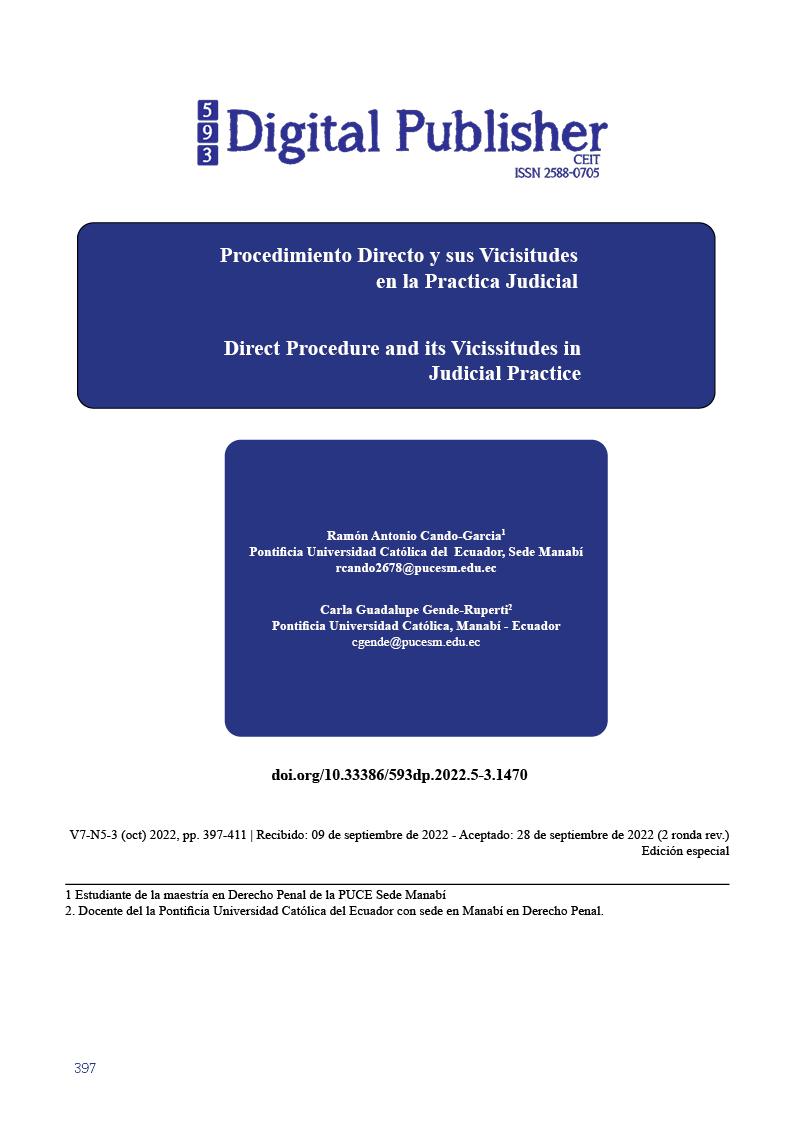Direct Procedure and its Vicissitudes in Judicial Practice
Main Article Content
Abstract
The purpose of this research is the study and in-depth analysis of the legal institution of the direct procedure replaced by the Reformatory Law to the Organic Comprehensive Criminal Code Official Registry No. 107 of December 24, 2019, in which new procedural rules are established, in respect to what is implemented by the Constitution and the International Instruments on due process, this investigation is focused on numeral 7, first paragraph of article 640 of the COIP, given that the judges of penal guarantees of the Portoviejo Canton do not abide by said legal provision and develop partially the stage of evaluation and trial preparation, without dealing with the elements of conviction on which the prosecutor's accusation is based, nor is it about the exclusion of illegal or impertinent evidence, within the context of legal dogmatics leading to the violation of the due process, compliance with the rules and the rights of the parties, legal certainty ica, we will examine at least 27 direct procedure sentences in the years 2021-2022 up to the present date of the investigation, we will develop the introduction of application of good practices by public servants with the purpose that justice operators carry out a good development in the direct procedure.
Downloads
Article Details

This work is licensed under a Creative Commons Attribution-NonCommercial-ShareAlike 4.0 International License.
1. Derechos de autor
Las obras que se publican en 593 Digital Publisher CEIT están sujetas a los siguientes términos:
1.1. 593 Digital Publisher CEIT, conserva los derechos patrimoniales (copyright) de las obras publicadas, favorece y permite la reutilización de las mismas bajo la licencia Licencia Creative Commons 4.0 de Reconocimiento-NoComercial-CompartirIgual 4.0, por lo cual se pueden copiar, usar, difundir, transmitir y exponer públicamente, siempre que:
1.1.a. Se cite la autoría y fuente original de su publicación (revista, editorial, URL).
1.1.b. No se usen para fines comerciales u onerosos.
1.1.c. Se mencione la existencia y especificaciones de esta licencia de uso.
References
Asamblea Nacional. (24 de diciembre de 2019). Ley Organica Reformatoria al Codigo Organico Integral Penal. Suplemento del Registro Oficial No. 107 , 24 de Diciembre 2019. Quito, Pichincha, Ecuador: Registro Oficial.
Abarca Galeas, L. H. (2018). Comentarios de Derecho Penal Especial y Procesal de Acuerdo al COIP. Babahoyo: Editorial Juridica L y L.
Asamblea Nacional. (2014). Codigo Organico Integral Penal. Quito, Ecuador: LEXIS S.A.
Binda, N. U., & Bernavent, F. B. (2013). Investigacion cuantitativa e Investigación Cualitativa:Buscando ventajas de las diferentes metodologias de Investigación. 181.
Binda, N. U., Binda, N. U., & Benavent, f. B. (2013). Investigacion Cuantitativa e Investigacion Cualitativa: buscando las Ventajas de las diferentes Metodologias de Investigacion. Ciencias Económicas 31-No.2: 2013 / 179-187 / ISSN: 0252-9521, 181.
Cevallos, A. (2021). Incidencia en la evacuación de causas penales con la aplicabilidad del procedimiento directo, en atención a la celeridad y el garantismo. Obtenido de http://201.159.223.180/bitstream/3317/16879/1/T-UCSG-POS-MDDP-104.pdf
Debido Proceso - Formas propias de cada juicio, T-242 (Corte Constitucional de Colombia 1999).
Duran, A., Sánchez, M., & Vilela, E. (2018). Inconstitucionalidad en la defensa del procesado dentro de un procedimiento directo en los delitos flagrantes. Universidad y Sociedad. Obtenido de http://scielo.sld.cu/scielo.php?script=sci_arttext&pid=S2218-36202018000200323
Ferrajoli, L. (2018). Derecho y Razon. Teoria del garantismo penal. España: Editorial Trotta.
Grunauer, E. (2016). El cumplimiento de los parámetros del debido proceso en el COIP. Obtenido de https://repositorio.uasb.edu.ec/bitstream/10644/4758/1/T1775-MDP-Grunauer-El%20cumplimiento.pdf
Habermas, J. (2010). Facticidad y Validez. Sobre el derecho y el Estado democrático de derecho en términos de teoría del discurso. España: Editorial Trotta.
Laclau, M. (2010). Interpretacion del Derecho e intuición en el Pensamiento de Savigny. Anuario de Derechos Humanos. Nueva Época. Vol. 11. 2010 (225-252), (225-252).
Miranda, L. (2017). Eficacia del procedimiento directo en la consecución de sentencias. Obtenido de https://repositorio.uasb.edu.ec/bitstream/10644/6036/1/T2528-MDPE-Miranda-Eficacia.pdf
Opinión Consultiva, OC_11-90 (Corte Interamericana de Derechos Humanos 10 de agosto de 1990).
Rasinger, S. (2020). La investigación cuantitativa en linguística. Argentina, España, Mexico: Akal.
Resolución , 10-2018 (Pleno de la Corte Nacional de Justicia 2018).
Resolución, 10-2018 (Pleno de la Corte Nacional de Justicia 2018).
Resolución, 10-2018 (Pleno de la Corte Nacional de Justicia 2018).
Ruiz Benitez, R. I. (2021). Buenas Practicas y Calidad de Servicio de Administracion de Justicia en los Organos Jurisdiccionales de huancabamba, Piura,2021. 11.
Sentencia, T242 (Corte Constitucional de Colombia 1999).
Sentencia, T-242 (Corte Constucional de Colombia 1999).
Sentencia, Almonacid y otros vs Chile (Corte IDH 26 de septiembre de 2006).
Sentencia, López Mendoza vs Venezuela (Corte IDH 1 de septiembre de 2011).
Sentencia, 11-13-SEP-CC (Corte Constitucional del Ecuador 4 de diciembre de 2013).
Sentencia, 002-14-SEP-CC (Corte Constitucional de Ecuador 9 de enero de 2014).
Sentencia, 740-12-EP/20 (Corte Constitucional de Ecuador 07 de octubre de 2020).
Solaris, L. (2018). Buenas prácticas y principios éticos: más necesarios que nunca. Scielo-Peru, 306-309.
Soto, A., & Saucedo, O. (2020). Derechos humanos, buenas prácticas y responsabilidad social. Aproximación cualitativa en empresas familiares. Revista Facultad de Ciencias Economicas, 107-122.


